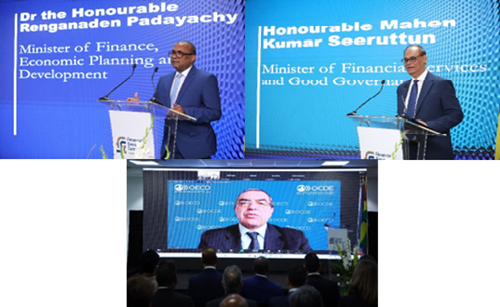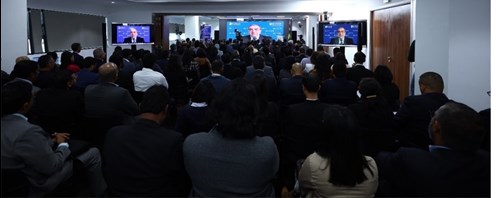Joint RCE-OECD hybrid workshop on “Sovereign debt management, sustainable bonds and debt transparency”

Day one (1) of the workshop consisted of two (2) sessions namely sessions 1 and 2.
Day two (2) of the workshop consisted of sessions three (3) and four (4).
The first day of the workshop explored risk management frameworks including contingency funding tools, investor relations concerning ESG considerations and ESG-labelled sovereign bonds, based on OECD countries’ practices. It was divided into two (2) sessions as follows:
Session 1: Sovereign debt management: Current challenges and mitigation techniques
The first session of the workshop elucidated the main policy challenges posed by the global economic and geopolitical environment for sovereign issuers and the potential policy responses considering country practices.
The speakers were from the OECD and South Africa.
- Ms Fatos Koc, Head of the Financial Markets Unit, OECD highlighted the importance of debt management across the world, including Mauritius. She spoke on the challenges faced by issuers in public debt management. She referred to the publication ‘Sovereign Borrowing Outlook 2023’ whereby the latest trends of OECD’s central governments’ borrowings and outstanding amount of OECD’s central government debts pre-pandemic and post-pandemic were illustrated.
- Ms Unathi Ngwenya, Chief Director of the Strategy and Risk Management Unit, Department of National Treasury, Republic of South Africa presented on the policy challenges posed by the global economic and geopolitical environment in South Africa and the potential policy responses.
- Mr Johan Krynauw,a Faculty Member of the African Development Institute of the AfDB, and Director of the Sustainable Public Debt Management Support Institution, South Africa gave an overview of the South African economy including other parts of Africa as a debt manager.
Session 2: Sovereign sustainable bonds
The session elaborated on the trends, benefits, and challenges associated with sovereign issuance of sustainable bonds, and present country practices that could assist sovereign issuers in their efforts to meet those challenges.
The speakers were from Mauritius, Seychelles, OECD and India.
- Mr Marc Van Beuningen, Group CEO of CIM Financial Services elaborated on the benefits to issuers and investors of sustainable bonds. He focused on the key challenges posed as to how to structure and issue sustainable bonds in the pre-issuance, issuance and post-issuance stages of bonds. He grounded his insights on the International Capital Markets Association Green Bond Principles, Social Bond Principles and Sustainability Bond Guidelines to guide issuers in establishing their sustainable bond framework.
- Mr Dick Labonte, Director General of the Debt Management Office in the Finance Department, Republic of Seychelles explained the concept of Blue Bond in Seychelles. He also highlighted the expected benefits reaped from the issuance of the Blue Bond.
- Ms Raksha Mishra, General Manager, Internal Debt Management Department, Reserve Bank of India outlined the different legislations and measures put forward by the Government about the issuance of sustainable bonds in India. She gave an overview of the timelines for the issuance of sustainable green bonds and elaborated on the features of sustainable green bonds issued by the Government of India.

The second day of the workshop focused on debt transparency. Speakers spoke on how a more transparent debt market can improve debt management and reduce the cost of debt. It was divided into two (2) sessions as follows:
Session 3: Debt transparency: benefits and challenges
The third session focused on debt transparency as one of the fundamental principles of prudent public debt management.
The speakers were from the OECD and the World Bank.
- Mr Riccardo Boffo, Policy Analyst in the Financial Markets Unit, OECD spoke about transparency based on the steps taken by the OECD and their plans. He further explained how data limitations are a very big challenge in the public sector and how there can be significant data gaps if contingent liabilities are not disclosed.
- Mr Diego Rivetti, Senior Debt Specialist at Macroeconomics Trade and Investment Global Practice of the World Bank presented the work conducted by the World Bank on transparency. He further explained the importance of the incentives for borrowers and lenders to operate in an opaque manner.
Session 4: Roundtable on progress needed to move forward: countries’ perspectives.
The roundtable focused on countries’ experiences with regard to the improvement of debt transparency and debt sustainability.
The speakers were from Mauritius, Senegal and South Africa.
- Mr Sridhar Nagarajan, Regional Managing Director, IQ-EQ highlighted that Mauritius is an African and an investment grade country. He mentioned that Mauritius was termed as such since the country was transparent and had a very solid framework. He further elaborated that the Mauritian framework pretty matched the recommendations of the OECD and the World Bank, and Mauritius had a Public Debt Management Act right from 2008.
- Ms Oulimata Ndiaye, Head of Advisory Services, UMOA-Titres WAEMU elaborated on the West African Monetary Union. She explained what had been done in terms of transparency and what were the main actions, challenges and tools used in the implementation of debt transparency.
- Mr Johan Krynauw, who also participated in Session 1, shared his experience as a debt manager for the roundtable in terms of the situation, the challenges, the good practices, and the comprehensive framework in Africa. Mr. Johan explained that sound and prudent debt management policies cannot be managed if they are not supported by sound and predictable transparent macroeconomic policies.

